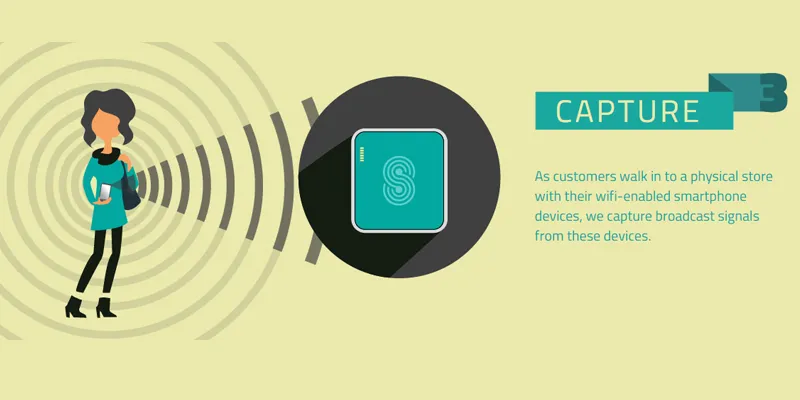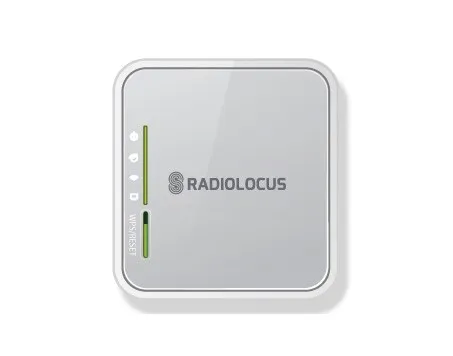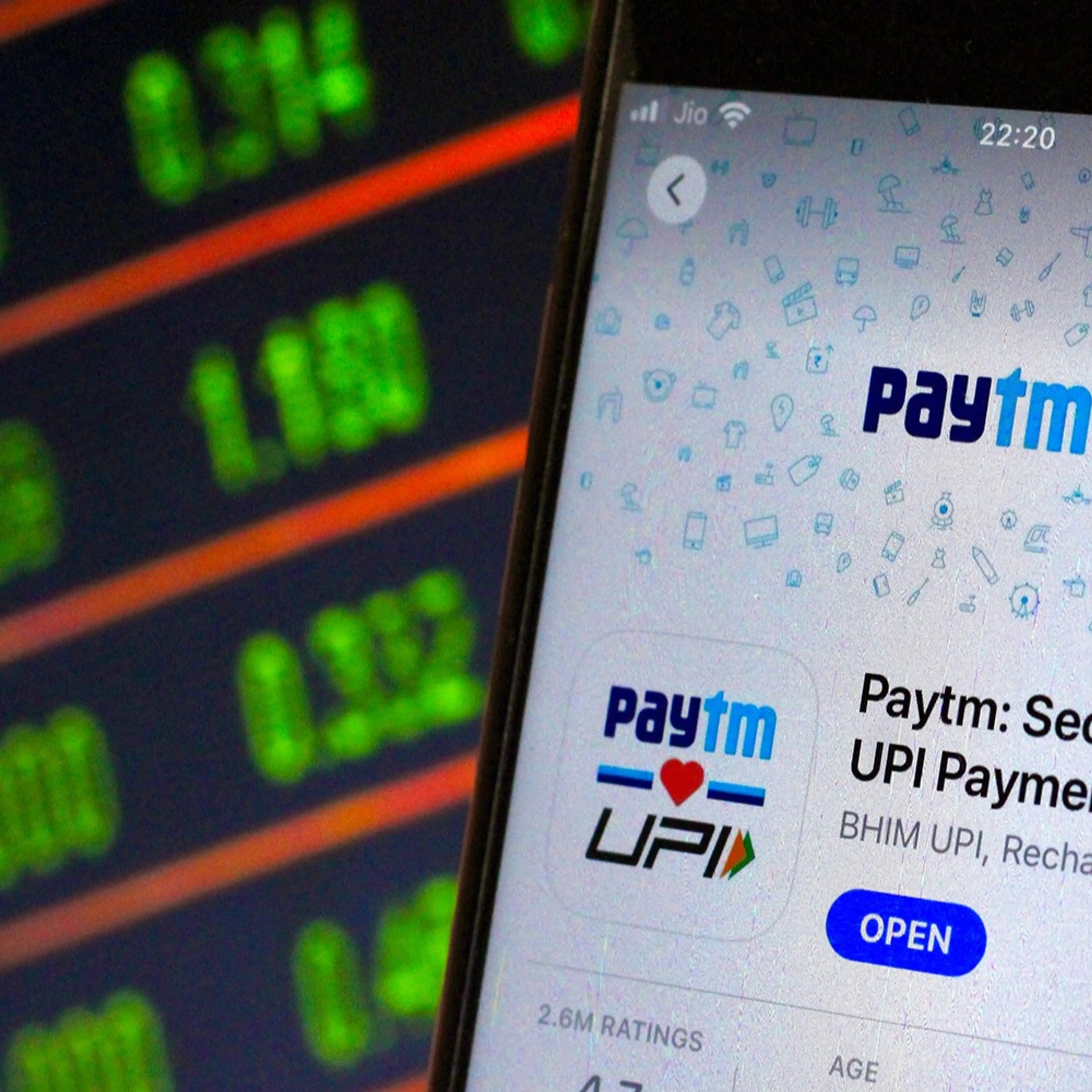Radiolocus, a Google Analytics for offline retail stores to measure foot traffic

E-commece players like Amazon and Flipkart use their site visitors’ data to target users better, but offline retailers never had this advantage till recently. They only know who you are when you shop, but not when you visit a store. Bootstrapped startup Radiolocus wants to give to brick-and-mortar stores what Google Analytics gives online retailers. Radiolocus’ plug-and-play technology is based on positioning (location pinpointing) using radio waves at indoor locations. In the past two quarters, the startup claims to have recorded data analytics for over 2.5million customers.

The genesis
The startup was founded in 2013 by Harshal Vora, who stumbled upon the idea when he came across research which described Wi-Fi as a base technology for indoor navigation and assisting students in a university to find out the nearest printer, meeting room, water cooler etc. At that time, Harshal was employed in a Komli Media, prior to which he worked in US-based mobile GPS-focussed startup Telenav. Harshal told YourStory,“On more research, I came across articles on TechCrunch on how indoor analytics can help retailers and various other industries. While at Komli Media, we were developing modules to profile customers based on websites that they visit and I realised that this data is not available in the offline world. Retailers do not know where their customers go apart from their store i.e. which restaurants, malls etc. (non competing businesses). Also, indoor navigation is practically unsolved till date, hence the technology seemed challenging enough to get into this product.” The startup has already started expanding its product offering to global markets, Germany, UK, Spain, Dubai, Singapore and Australia.
The case for Radiolocus
Retailers are understandably interested in tracking their store visitors and calculating repeat customers; that is why loyalty cards exist. At the moment, most stores calculate the same manually with options like tickers at the door, sensors at the gate and video analytics for head count.
Radiolocus uses Wi-Fi signals as the distinguishing advantage for unique identification as it is ubiquitous and does not interfere with the customers' shopping experience.
Harshal explains the need for offline analytics: “One can understand the amount of time spent in different sections of the store which, when compared with product category level sales, gives an understanding of their marketing campaign effectiveness, service/store level operations, and staffing productivity. The path of the visitors in the store can be studied to improve planograms and store layout. Since we also understand repeat customers across locations and different brands, it opens a whole new opportunity to profile their customers, understand their phsychographics and evaluate cross location promotions and campaigns. Our data helps retailers visualise the diversity across customers and their behaviour in different regions of the country to take regional-level decisions.”

Metrics Radiolocus dashboard show for the retailer
In order to measure store walk-ins and in-store activities, the Radiolocus dashboard allows integration onto retailers existing systems and data can also be exported in CSV or fetched using an API.
“Our metric-suite includes analytics from visitor flow to consumer engagement and behaviour and helps businesses analyse existing marketing concerns, fathom service/location level irregularities, increase operational productivity and deliver the enhanced customer experience! With the total visitors, new visitors, repeat visitors, dwell time, visitor flow, frequency and recency of visitors - all of this can be for the entire store or individual zones within the store. These metrics can be sliced and diced based on granularity, sub-granularity, daypart, location etc. Data can also be compared across locations and across zones,” added Harshal.
Radiolocus charges a one-time cost for the hardware while the analytics can either be a monthly fee or a one-time fee based on the store/location size.
Privacy, privacy, privacy
If a customer shows up at five different locations at different retailers' venues, there is bound to be a data overlap at Radiolocus back-end because of the tracked media access control (MAC) addresses. But we are told the data stays silo. Harshal said, “We know it will be the same customer since the MAC ID will remain the same. We do not share consumer data of one business to another, unless we have explicit consent from the businesses if they want to run cross promotions. However, we do use this information to profile customers.”
Radiolocus hashes the MAC address which is a one way hashing function. Harshal adds “So even if our database were to compromise, no one will be able to find out the MAC ID from the hashed MAC address. While sharing data with partners we apply a second level of hashing with a different key for each partner for additional security.”
Radiolocus claims to provide aggregated and anonymous analytics to its customers and does not collect any personally identifiable information and the raw MAC address is immediately hashed. It also gives an opt-out form on its website that allows customers to be excluded from Radiolocus database. Though its not clear how many of user will go to that length of opting-out, or even to know what their MAC address is. But Harshal tell us “We actively educate all our customers to put up signages across locations where our product is deployed.”
He adds “We are also in the final stages of enrolling with FutureOfPrivacy which is a global community which mandates us to adhere to their code of conduct. We already have processes to adhere to their code of conduct, the final sign off remains to be completed.”
The tech stack
There are multiple ways of tracking customers in a physical scenario. Using Wi-Fi radio signal, Radiolocus passively tracks consumer behaviour across physical locations. Other technologies, like NFC-enabled cards require a customer to enroll into the customer loyalty program. LED lighting technology requires a mobile app to be downloaded on the customer's phone. Wi-Fi fingerprinting is a machine learning method to determine accurate position of visitors in a store, though it is not a technology as such. Apple’s iBeacon uses Bluetooth low energy proximity sensing to send unique identifier signal. According to Harshal there are many Bluetooth 4.0 companies who seem to provide a similar set of analytics, however one has to understand that currently the sample set of bluetooth is really low and has basic technological limitations. It also requires an app for proximity marketing which according to Harshal is a bottleneck.
Wi-Fi, on the other hand, does not require any sort of customer engagement, very high sample set size, and the range and frequency of Wi-Fi provides much more accuracy in calculating the location.
It is clearly the winner when it comes to pure analytics to understand the behavior of customers.
Harshal tells us, team Radiolocus has put in immense efforts to understand nitty-gritties in the field of networking, large data processing based on 2D and 3D location, mathematical modeling & learning and finally reporting and UI. He said “We use various frameworks such as Hadoop, Storm, Netty, Cassandra, Oozie, Queues etc. and all the software is developed inhouse. The software for our sensors is custom written in c/c++ and use R for mathematical modeling. Our backend is hosted on Amazon servers in Singapore and take data anonymity and individual privacy seriously.”

Using tough problems as a tool to assemble a team
Everyone who has joined Harshal has done so as they found the product innovative and different from other startups, he said. “Everyone has the liberty to take various decisions on their own, without my involvement and they enjoy the responsibility, learn from their mistakes and are even more productive,”he explained.
Global competition
In terms of analytics, Radiolocus is competing with a few global startups in the US such as Euclid Analytics, Nomi, RetailNext and Walkbase. Harshal said, “Although we are currently not in the business of providing indoor navigation, in terms of the technology we are competing with companies like Google, Apple, Nokia which are actively working on developing indoor navigation capabilities. Cisco also provides certain metrics but their main focus is managing networking infrastructure and not analytics. As far as India goes, we haven’t heard or come across any company providing this solution or analytics.”
YourStory’s take
This is a 'making-in-India' product relevant to the global market. Every organised business where people walk in to, be it retail, events, airport, F&B, hospitals, public places, stadiums,wants to understand its customers. In ancient days when we lived in smaller town, every shop owner knew everybody in town. But as cities become bigger and bigger, those personal touches become impossible due to scale. With the use of offline analytics like Radiolocus – if privacy matters are taken care of according to what is best for customers as opposed to what is best for retailers – it is possible to bring back good old personalised experience at a scale to delight shoppers.
Visit the site: radiolocus.com











